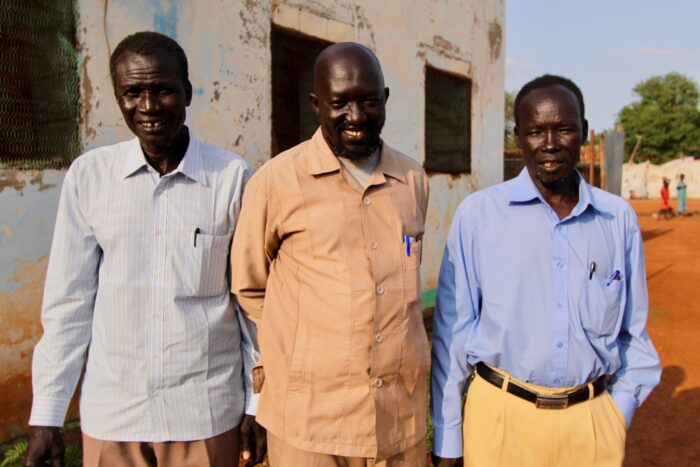Effective school management and supervision for lasting change
April 8, 2021 10:34 amThe Supportive School Supervision component of GESS has not received as much attention as some of the other Programme components due to school closures. However, GESS State Anchor Team Leader for Western Bahr el Ghazal State, Andrea, believes it to be a vital pillar for ensuring lasting change.
Supportive School Supervision is a capacity building programme for State Ministries, County Education Departments (CEDs) and Payam Education Supervisors (PESs). The objective of the Supportive School Supervision component is to help the trainees to identify learning and teaching problems that affect the quality of education in schools.

Payam Education Supervisors from Maban in Upper Nile State. Photo was taken pre-COVID-19.
“I had been tracking some of State and County Education Department officials in supporting and monitoring of schools in implementing GESS activities, such as writing of quality School Development Plan and Budgets (SDPs/Bs), as well as ensuring the timely submission of accountability documentation so that schools receive their Capitation Grants. They have also been observing the quality of teaching in schools and making recommendations”, Andrea narrated.
He continued, “I identified Marcello Mawein Mayuot, Payam Education Supervisor for Wau Bai Payam, Jur River County, Western Bahr el Ghazal State as one of the most effective PESs who acquired necessary skills through the GESS training. He has assisted all of the schools under his supervision to clear all of their accountability documentation for 2019, as well as helping them to submit 2021 SDPs/Bs. I sat down with Mawein to discuss this.”
“I am called Marcello Mawein Mayuot, a 39-year-old third-year student at the College of Education, University of Bahr el Ghazal. I have 18 years’ work experience with the Ministry of Education.” Before becoming a Payam Education Supervisor in Wau Payam, Jur River County, Marcelo had been a classroom teacher for over five years and Head Teacher for more than seven years. As a PES, he received training from GESS on supportive school supervision. Before this, he explains, “I had been doing things differently, not professionally – teaching and the administration of school and pupils’ management, as well supporting teachers, was harsh – it was a sort of policing and use of excessive powers.”
The training with the PESs aims to equip them with technical support to keep GESS Capitation Grants operational and used effectively. PESs are also be trained on school governance; standards for primary schools in South Sudan; following up on implementation of school calendar; and on the National Girls’ Education Strategy 2018-2022. Gender and disability inclusion are mainstreamed throughout the training.
Marcello continued, “After attending several training sessions on supportive supervision and writing a quality School Development Plan and Budget, there has been remarkable change in the way I approach the Head Teachers, teachers and School Management Committees. It is collaborative. It is evidenced in the early submission of budgets, Pupil Admission Registers, Cash Transfer Enrolment Forms and accountabilities, as well as an increased number of schools qualifying for GESS Capitation Grants”, he added.
Supportive School Supervision training will reach an estimated 500 PES and 1,000 County Education Officials/State Ministry Officials during the second phase of GESS.
From late 2020 into early 2021, we engaged PES from all of the ten states and three administrative areas in a two-day refresher training along with Head Teachers and some School Management Committee/Boards of Governors (SMCs/BoGs) members. The training detailed how to fill in, complete and quality assure SDP/B packs. We also trained participants on COVID-19 preventive measure and how to safely reopen schools and manage them during the COVID-19 pandemic.
However, due to COVID-19 restrictions we have not yet been able to deliver the school based face-to-face trainings. Plans to administer training sessions online were hindered by a lack of equipment and Internet connectivity.
Tags: Development, education, EducationCannotWait, FCDO, GESS, girls' education, Global Affairs Canada, Quality Education, South Sudan, Training, UKaidCategorised in: Quality Education, Teachers